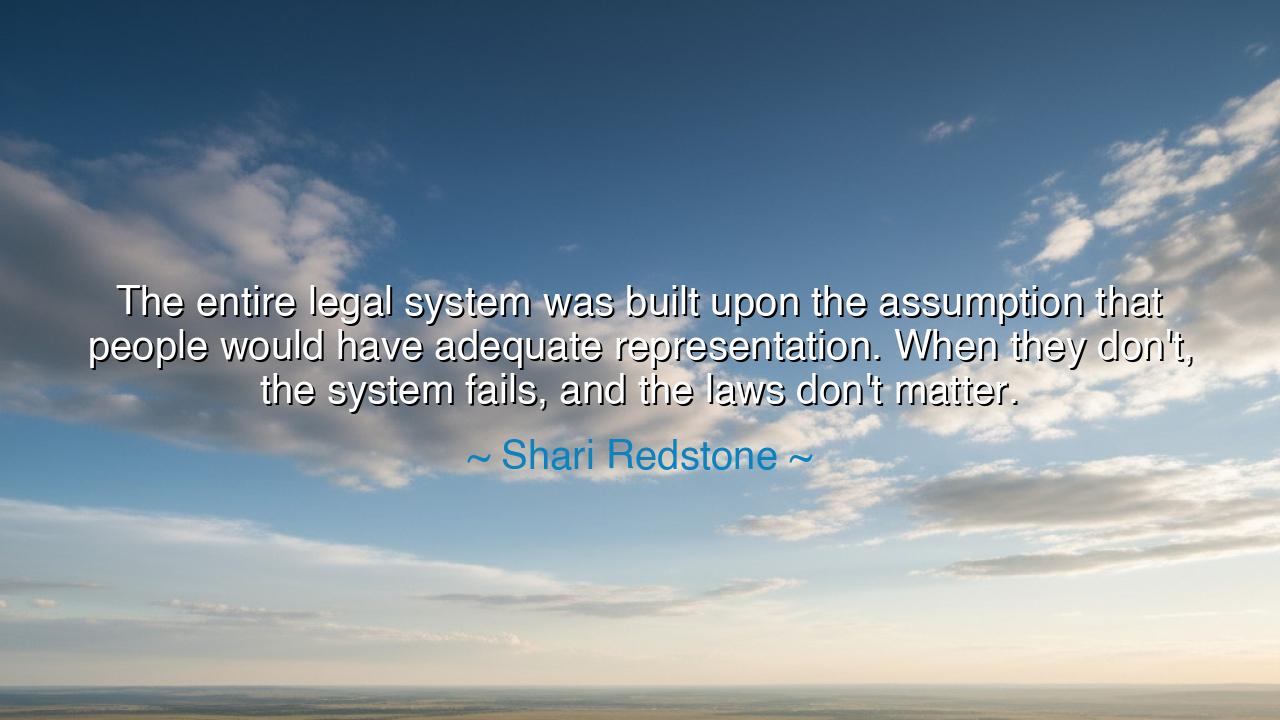
The entire legal system was built upon the assumption that people
The entire legal system was built upon the assumption that people would have adequate representation. When they don't, the system fails, and the laws don't matter.






When Shari Redstone declared, “The entire legal system was built upon the assumption that people would have adequate representation. When they don't, the system fails, and the laws don't matter,” she was not speaking merely as an observer of justice, but as a prophet warning of its decay. Her words pierce through the illusion that law alone sustains order; for she reminds us that without the human element of fairness — the advocate, the defender, the voice that ensures every person is heard — the structure of law is hollow. What she speaks of is not just the collapse of courts, but the corrosion of trust — that sacred bond between the governed and those who govern.
The origin of this quote arises from Redstone’s reflections on equality and justice, themes deeply intertwined with her philanthropic work and advocacy for social reform. Though best known for her role as a media executive, Redstone has long emphasized the moral responsibilities that underpin power. Her insight reflects a universal truth: that justice is not automatic, but must be carried out by the hands of the righteous. The founding vision of any legal system — whether in Athens, Rome, or America — depends not only on written codes but on the faith that those codes will be interpreted and defended by capable, ethical representatives. When that faith is betrayed, the temple of justice collapses under its own weight.
The ancients understood this danger well. In the courts of Athens, where the seeds of democracy were first planted, citizens were called upon to defend themselves before juries of their peers. But as time passed, the rich began to hire professional orators — skilled rhetoricians who could twist truth with golden tongues — while the poor stood alone, voiceless and vulnerable. Plato himself lamented that law without equality of defense was but “organized injustice.” So too, in Redstone’s words, we see this same lament echoed through time: the moment representation becomes a privilege rather than a right, justice ceases to serve the people and begins to serve power.
There is perhaps no greater modern illustration of this truth than the case of Gideon v. Wainwright in 1963. Clarence Earl Gideon, a poor drifter in Florida, was accused of burglary and denied a lawyer because he could not afford one. He stood alone before the court, defended only by his own untrained words, and was swiftly convicted. From his prison cell, Gideon wrote a humble petition to the Supreme Court, arguing that his conviction violated the Constitution’s promise of fair trial. The Court agreed — and in doing so, reaffirmed the principle that no one should face judgment without counsel. This was the living embodiment of Redstone’s message: when the powerless are left defenseless, the system itself becomes guilty.
Redstone’s quote speaks not only to courts of law but to every institution built upon the principle of fairness. The “failure of representation” she warns of is not limited to lawyers and judges — it extends to leaders who forget to represent their people, to journalists who fail to represent the truth, to educators who do not represent the potential of every child. When representation falters, when voices go unheard, the laws, the systems, the policies — all crumble like dust. Her statement is therefore not only a critique, but a call to renewal — a reminder that the soul of justice lies in empathy.
Her words also echo the teachings of Confucius, who said, “If the people are led by laws and punishments, they may avoid crime but lose conscience; if they are led by virtue and fairness, they will gain both conscience and harmony.” The balance between law and representation, between justice and compassion, is delicate and eternal. Laws must not be weapons, but instruments tuned to the harmony of human dignity. When one string — representation — snaps, the melody of justice becomes dissonant, and the song of civilization falters.
Let this, then, be the lesson that echoes from Redstone’s wisdom: that laws are only as strong as the hands that uphold them, and justice only as sacred as the hearts that defend it. The duty of society — from lawyer to citizen, from judge to leader — is to ensure that no one stands alone before the power of the state. If you see a person silenced, speak. If you see a right denied, act. For justice is not a structure built once and left standing — it is a living flame that must be guarded daily. When the people defend one another’s dignity, the law lives; when they do not, the law dies, and with it, the very idea of civilization.






AAdministratorAdministrator
Welcome, honored guests. Please leave a comment, we will respond soon